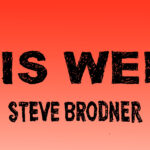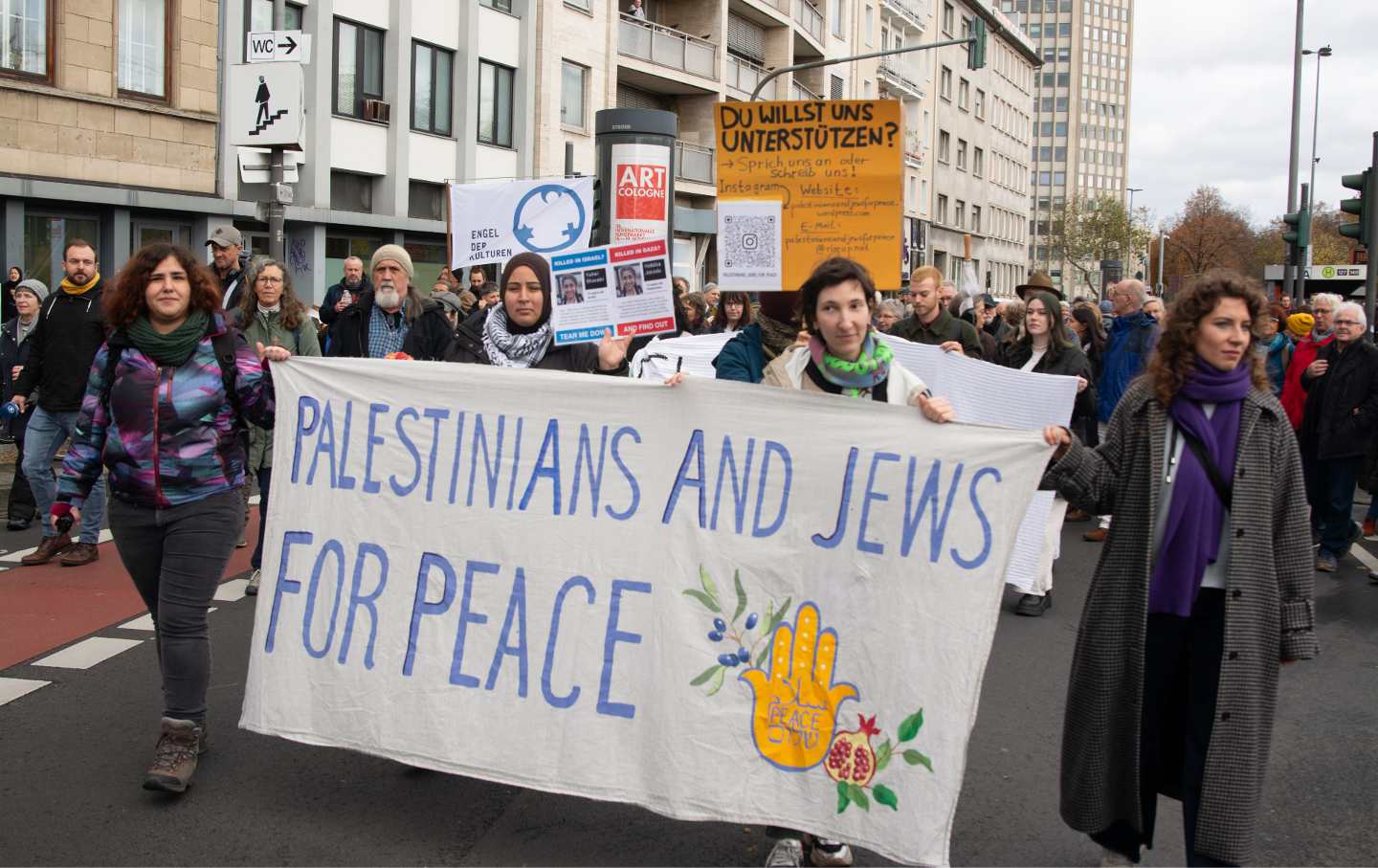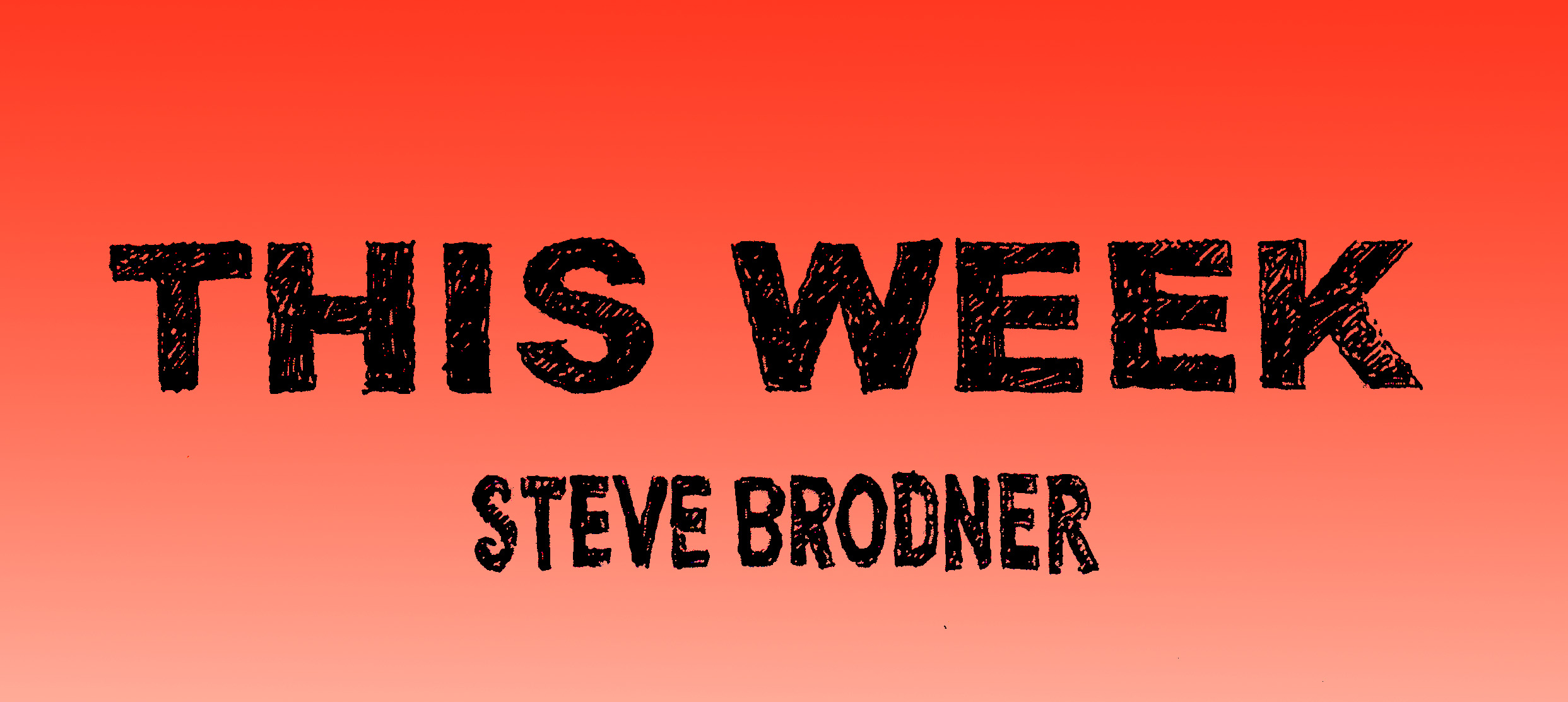/
November 30, 2023
The Lesson From This War: Peace Is a Public Health Issue
If public health is about human health and flourishing, then assault, torture, murder, and war are all our business.
A peace walk in Cologne, Germany on November 19, 2023. (Ying Tang / NurPhoto via Getty Images)
I say across the waves of the air to you:
today once more
I will try to be non-violent
one more day
this morning, waking the world away
in the violent day.
—Muriel Rukeyser, “Waking This Morning,” 1973
What is happening in Israel and Gaza right now is horrific. The indiscriminate killing of thousands of Palestinians, the Hamas attacks in Israel, and the subsequent hostage-taking on October 7 are and were barbaric. It is tempting to weigh the bodies and make a distinction in numbers about these events, but that is an argument about extent and scope–as if there is a threshold of acceptability for the loss of human life. It is also tempting for some to suggest that the violence happening was justified from one side or the other, but what does it mean when every answer is a gun? When violence gets condoned for political reasons, we’re traveling on a dark road, where killing is just a matter of finding the right rationale, the right time.
I am not usually reticent about speaking my mind, but the enormity of what has been unfolding has humbled me. I am not an expert on the Middle East. I work in public health. I can surely say what I have said above, the killing is an abomination. But then I am stuck. I have no other truths to speak.
A friend of mine challenged me the other day on my relative silence about what is happening in Gaza and Israel. I told him I had nothing useful to say, nothing that hasn’t been better said by others, particularly those with deep connections to the region.
Current Issue
But that rebuke, by someone I love, made me think. In fact, as someone in public health, I do have something to say: Violence is and always will be a public health issue, whether it is in the home, in our communities, or on the world stage. If public health is about human health and flourishing, then assault, torture, murder, and war are all our business. The events in Gaza and in Israel are our business, as is the war in Ukraine, and the large, and largely ignored conflicts in Myanmar, the Maghreb, and Sudan.
Those last three conflicts have each killed around 12,000 people this year. Add up the dead this year from all world conflicts and the toll is enormous. Add in the violence in many communities ostensibly in peacetime now—over 35,000 deaths by firearms in America in 2023 so far. While we have seen bloodier centuries, again, the point is not how many bodies lie dead but the fact that so much killing is happening at all in the 21st century.
The challenge to those of us in public health is not just to speak out but to be active proponents of nonviolence and peacemaking. This means taking an abolitionist view of sorts, in which we work toward a world in which violence is a thing of the past. I am not naïve enough to think that this is an achievable goal right now, but that must be our ultimate aim, or we will remain complicit in some way.
There is a powerful tradition we can tap into. My earliest training in public health with ACT UP, the AIDS Coalition to Unleash Power, was not only about learning about HIV/AIDS. It was also about understanding the connection between health and human rights, and about using nonviolent resistance to achieve public health goals. The Rev. William J. Barber II, my fellow Nation correspondent and the founder of Repairers of the Breach and the Poor People’s Campaign: A National Call for a Moral Revival, has recently embarked upon a campaign to confront poverty as a leading cause of death in America. He is also a leading practitioner of nonviolent resistance in pursuit of his aims. Barber is now teaching at the Yale Divinity School, and public health students have enrolled in his course.
Dedicated public health advocates are already doing vital work on violence prevention, documenting the extent of violence of all kinds perpetrated locally and globally, crafting interventions, and shaping policy. But I would suggest we go further and make practicing and teaching nonviolence and peacemaking even more central to public health.
What would it mean, on a day-to-day basis , for public health leaders to model nonviolence and peacemaking in their lives? I’ve been thinking a lot about this. If your community is like mine, people have split into camps in the last few weeks. Friendships have been riven over the Israel-Gaza conflict, and the deepening divide is likely to linger. We cannot broker peace in the Middle East, but what if we try to broker it where we live?
Popular
“swipe left below to view more authors”Swipe →
A People’s Obituary of Henry Kissinger
A People’s Obituary of Henry Kissinger
Henry Kissinger, War Criminal—Still at Large at 100
Henry Kissinger, War Criminal—Still at Large at 100
The Right to Speak for Ourselves
The Right to Speak for Ourselves
The “Harvard Law Review” Refused to Run This Piece About Genocide in Gaza
The “Harvard Law Review” Refused to Run This Piece About Genocide in Gaza
As Libby Lenkinski, a vice president at the New Israel Fund, told The New York Times in an article on the work of a group of Jewish and Palestinian Israelis trying to bridge divides in their home country: “This isn’t, ‘Kumbaya, let’s all hold hands and love each other,’ It’s: ‘There’s actually no way that one side is going to win. Our futures are intertwined and the only way that we can keep ourselves alive is by keeping each other alive.’”
I believe you can try to build toward peace where you find yourself. This means understanding that multiple, conflicting truths can coexist at the same time about Gaza and Israel, and rejecting extreme polarization that keeps any dialogue from happening. It’s not a version of “can’t we all just get along” but a recognition that we have no other choice but peace. It’s a practical politics that rejects an ongoing stalemate or annihilation of the other as untenable.
Perhaps this sounds like a hokey or limited aspiration. Perhaps people want to remain locked in the comfort of their own certainty. What, then, is the alternative before us? Other people will always be there to strike the match and fan the flames of violence. The pursuit of nonviolence will always be the minority position. But it is still a noble pursuit.
In a series of essays for Combat, the journal of the French Resistance during World War II, Albert Camus put the choice succinctly in the face of the unimaginable carnage of that era:
To save what can be saved so as to open up some kind of future— that is the prime mover, the passion and the sacrifice that is required. It demands only that we reflect and then decide, clearly, whether humanity’s lot must be made still more miserable in order to achieve far-off and shadowy ends, whether we should accept a world bristling with arms where brother kills brother; or whether, on the contrary, we should avoid bloodshed and misery as much as possible so that we give a chance for survival to later generations better equipped than we are.
And I think this is public health. It is “giving a chance for survival to later generations better equipped than we are.” It is standing up against violence and for peace as an active practice, an intervention, which cannot end when the latest crisis has abated. It is understanding that violence is a choice, not an imperative, and that choosing peace is something we can do in our own lives, and in our own communities, before moving it into the wider world. It is something we can teach. It is something we can pass on.
Gregg Gonsalves
Nation public health correspondent Gregg Gonsalves is the codirector of the Global Health Justice Partnership and an associate professor of epidemiology at the Yale School of Public Health.
More from The Nation
“You’re Profiting From Palestinian Deaths”: Student Protesters Confront Brown University’s President
“You’re Profiting From Palestinian Deaths”: Student Protesters Confront Brown University’s President
Activism / StudentNation / November 30, 2023 The Lesson From This War: Peace Is a Public Health Issue Days after the attempted murder of three Palestinian students in Vermo…
A Historic March in London
A Historic March in London
“A statement from millions moving as one affirming a single truth: that what is done to one, must be felt by us all.” —Ru Freeman
Revolution? Hell Yes! Remembering Amber Hollibaugh
Revolution? Hell Yes! Remembering Amber Hollibaugh
The writer, who died last month, spent a lifetime breaking silences around sex.
The Ghosts of the Worldwide Surveillance Apparatus Show Their Hand
The Ghosts of the Worldwide Surveillance Apparatus Show Their Hand
Phantom Parrot, a British documentary now screening in the US, sheds light on the Orwellian technologies being used across borders to repress activists, journalists, and others.
Radical Left
Radical Left
Shots will be shot.
Solidarity and Artivism
Solidarity and Artivism
Bringing relief.


